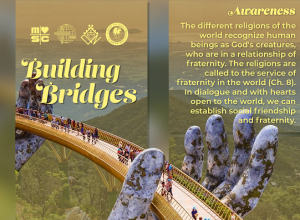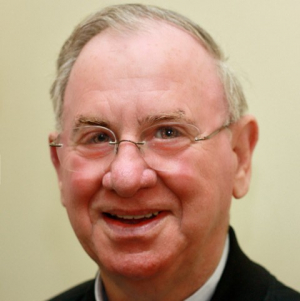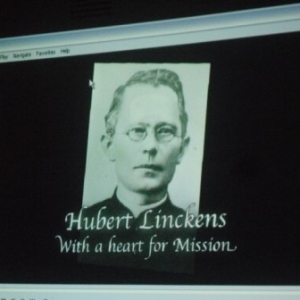Peter MALONE
Blue Geranium, The
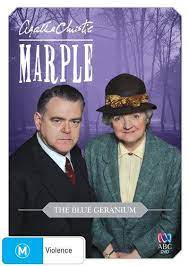
THE BLUE GERANIUM
UK, 2010, 87 minutes, Colour.
Julia McKenzie, Toby Stephens, Kevin McNally, Claire Ashbrook, Sharon Small, Claudie Blakley, Joanna Paige, Ian East, Donald Sinden, Jason Durr, David Calder, Paul Rhys, Patrick Baladi, Caroline Catz.
Directed by David Moore.
The Blue Geranium is one of the Miss Marple television films featuring Julia McKenzie as Miss Marple. It is based on a short story. It reinforces the popularity of Agatha Christie stories and television versions.
As with so many of the stories, one of the most obnoxious characters is murdered. She is spoilt, superstitious, wife of the local millionaire. She is played effectively by Sharon Small. Her husband is played by Toby Stephens. With a setting in a small village, there are inter-relational tangles, two sisters married to 2 brothers, the millionaire and a would-be writer who has a gambling compulsion. His wife is very diligent, was engaged to the millionaire but he was snared by her sister. She keeps attending to her sister. There is an attentive local doctor who, it is revealed, has been supplying the wife with a placebo. There is the local vicar with whom Miss Marple stays, angry with the woman, needing money for his collapsing church. And his niece works at the house but is in love with the doctor. There is also a former maid and the current maid.
As with these television films, there are many veteran character British actors in the supporting cast as well as several veterans – in this case, Donald Sinden, 60 years after his first appearing in films. (There is an amusing scene where Miss Marple wants to interview him at an all-male club, treated with supercilious snobbery by the concierge but the rules altered for her to come in.)
Much of the story is told in flashback, a court case being held in which the millionaire has confessed and is to be executed. Miss Marple gets a brainwave, attempts to halt the proceedings, comes to the court and explains the whole situation, accusing the person who seems least likely but, in fact, is the killer.
- The popularity of Agatha Christie stories? Miss Marple? The three actresses?
- This film based on a short story? A narration? Amplified into a feature film, the role of miss Marple?
- The title, the flowers on the wall, Mary and her aversion to blue? The appearance of the blue flowers, and the later explanation of how the colours could change?
- The prologue, Mary Pritchard, her tantrums, her death? The other members of the family?
- Six months later, the court case, George Pritchard to be found guilty? The newspapers? Miss Marple in the garden, the discussion about the wasps, the mixing of the liquids? Her sudden awareness, trying to contact Detective Somerset, his refusing the call? The long friendship with Sir Richard, phoning him, urging him to halt the hearings, going to meet him, the all-male club, the prissy concierge, Sir Richard as trustee and overcoming the regulations, her sitting in the club, the discussion?
- The action in flashbacks, Miss Marple telling the story, her visit to the town, on the bus with Seward, the conversation, his condition, quoting poetry, his mission? Miss Marple in the town, met by Dermot, Hester, his niece, the comments about the church, the repairs, the need for money? His long service in the town? Hester, her work for the Prichard’s, the doctor and his attention to her?
- The situation of the Pritchard home, Mary, in bed, her tantrums, relying on superstitions, astrology…? Her to studying for Caroline working for her, the wrong chocolates…? Concern by her husband, trying to placate her, yet making demands on her to come to the golf day, her reliance on the doctor, the favourite medicine, the placebo? And the glimpse of the doctor pocketing items from the house? His friendship with George? The explanation of Philippa, engaged to George, Mary intervening, marrying George, and Philippa and the rebound, marrying his brother, his attempt at writing, his gambling, the deaths, the children?
- George and the philanthropy, praise of his work, the golf and team, everybody present, the celebration? Miss Marple observing?
- The children finding Seward’s body, suspicion of murder, suspicion of suicide, the broken tie? His background, the connection with George and the money loans? His wife and her disappearance? The various suspicions? His coming to see his wife, to reconcile with her after his rehabilitation? Somerset, Miss Marple’s interventions, his scepticism, and the irony that it really was suicide?
- Mary, her tantrums, her death? The previous visit of the veiled woman and her prophecy? The prophecy for her death?
- The scene in the church, Mary’s denunciation of Dermot, on people wanting money, her rant? Motives for people to kill her? Dermot and his unwise comments?
- The character of Hazel, coming to the village, her art and portraits? Suspicions of her? Her affair with George? Her studio? The revelation of who she was, removing her wig? The suspect for the death of her husband?
- The former maid, the affair with George, her being found in the hut, dead, pregnant?
- Philippa, her devotion to her sister, making for her sister, accusations of gluttony (and Dermot’s pictures of the seven deadly sins)? Her exasperation with her husband?
- The halting of the case, Miss Marple in court, explaining to the judge? The focus on Philippa, her poisoning her sister, revenge? But not murdering her? The explanation of Dermot feeling ill, having secretly had some of Philippa’s cake mix?
- George, confessing, to defend the woman he loved? Prepared to die? The link with the seven deadly sins, vanity?
- Miss Marple turning the tables, Caroline as prominent in the story but the least likely suspect, the clue that Philippa said about the obnoxious black market woman during the war, her greed, killing Mary, posing as the veiled seer, killing the previous maid? Her reaction in court?
- The Agatha Christie twists, the lease suspects guilty, and a romantic ending, and Miss Marple and her achievement?
Greenshaw's Folly
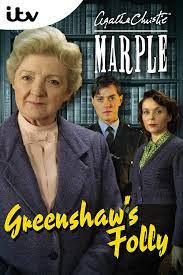
GREENSHAW'S FOLLY
UK, 2013, 90 minutes, Colour.
Julia McKenzie, Fiona Shaw, Martin Compston, John Gordon Sinclair, Kimberly Nixon, Bobby Smalldridge, Vic Reeves, Julia Sawahla, Sam Reid, Rufus Jones, Joanna David, Robert Glenister, Judy Parfitt.
Directed by Sarah Harding.
While Greenshaw’s Folly as the title, a short story by Agatha Christie, the screenplay also incorporates material from another short story, The Mark of St Peter.
Agatha Christie fans were not so enthusiastic about this film. While Joan Hickson provided something of a norm for Miss Marple, Geraldine McEwan and Julia McKenzie offered variations.
The title refers to an old building which has some sinister history. It was built by an eccentric scientist who experimented, exploiting orphan children, to find a vaccine for polio. It is now owned by his science expert daughter, Katherine, Fiona Shaw. Her friend Miss Marple rescues a young woman and her son from a violent husband bringing her to Greenshaw’s, finding a number of people in residence, the housekeeper, a butler, a historical researcher, an aspiring actor, nephew of Katherine, and Alfred, the gardener.
The butler is killed. The researcher disappears. And, Katherine is struck by an arrow as she works in the garden.
The plot is quite complex, with quite some twists, but Miss Marple sees through the complications, gets documentation to prove her case, to the increasing frustration of the inspector, John Gordon Sinclair (Gregory’s Girl). There is quite some complication in the motivation, financial greed, as well as the staging of the killing. As with the other films in the series, a good number of British character actors in supporting roles.
- The popularity of Agatha Christie mysteries? Miss Marple? The three actresses in the television versions?
- The title, the building, the sinister backgrounds of experiments, polio vaccine, exploitation of orphans? Miss Greenshaw and science, plans, catalogues? Those staying at the folly?
- The opening, Louise and Archie, the pursuing husband, her fear, Miss Marple’s help, driving to Greenshaw’s? Katherine receiving them? Employing Louise as secretary? Welcoming Archie?
- The members of the household, the butler, former alcoholic, telling Archie ghost stories, midnight, fall to his death? Miss Creswell, the housekeeper? Nat Fletcher, Katherine’s nephew, getting to know his aunt? The visit from Horace Bindler, his research, his disappearance, later the finding of his body?
- The happy sequences, Louise settling in, Nat Fletcher and his attentions, Alfred and the bow and arrow, bonding with Archie, playing? Miss Marple’s presence? Katherine’s cheerfulness?
- The orphanage, the background, Father Brophy, the need for donations, the visits to Katherine and her refusal? His drinking? His friendship with Alfred, Alfred formerly at the orphanage?
- Nat Fletcher, actor, rehearsing his lines, has ambitions, Miss Marple and Archie going to the play, enjoying it?
- Miss Creswell, housekeeper, the death of the butler, her extra jobs, her being critical?
- Katherine, her eyes, explanation to Archie to get the treatment for her office? Miss Marple receiving the phone call, the misinterpretation about the fish, the realisation that Catherine was ringing about the antidote for her eyes? Her death?
- Louise, fears of her husband, sensing his presence, driving away, rescued by Alfred, Nat trying to do the government thing? The husband arriving in the car, the confrontation, his flight? The revelation that he had tied up the policeman, infiltrating the house, his rages, tied up?
- Katherine in the garden, her eccentric hat, her cloak, with the weeds, being struck by the arrow, struggling into the house? Miss Creswell and Louise locked in their rooms? Archie, his getting out, the episode with Cicely, her rescue, calling him Edwin, memories of her own brother? Miss Marple talking with her, coming to her senses, her stories of the past and the experiments?
- Miss Marple, working for the order image, making the scarves, the women auxiliary, her sending a woman to London to Somerset house for documents?
- The inspector, tolerance of Miss Marple, getting less tolerant, listening to her, his absence from the house and the group confined overnight, finding the policeman tied up?
- Miss Marple, the explanations, Miss Creswell and her background, the connection, her son, wanting to get Katherine’s fortune, the butler knowing the truth, Bindler and his attempt to blackmail Nat and that killing him? Miss Creswell and her impersonating Katherine with the arrow, Nat later coming and putting the arrow in Katherine’s neck? His alibi, the police question, driving from the play, returning in time for the curtain call?
- The explanation of the plan to get the inheritance? The irony of Alfred, working as the gardener, at the orphanage, time in jail, being scene stealing the candles, the irony that it was Father Brophy stealing them and Alfred returning them, the revelation about his identity?
- Louise and Archie, to move on, Alfred inviting them to stay?
Murder Pact, The
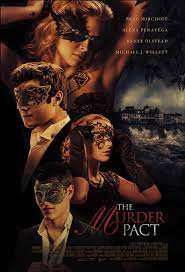
THE MURDER PACT
US, 2015, 85 minutes, Colour.
Alexa Peña Vega, Beau Mirchoff, John Heard, Ethan Phillips, Sean Patrick Thomas, Bailey De Young, René Olstead, Michael J Willett.
Directed by Colin Theys.
Once upon a time there was Alfred Hitchcock’s classic, Rope. It was based on the Leopold-Loeb murder pact in Chicago in the 1920s. There have been various versions and variations on this plot including Compulsion and more historical explorations. This is a variation on the theme for television audiences, younger television audiences.
And, it states that it is based on Edgar Allan Poe’s The Tell-tale Heart.
We are introduced to four ambitious preppies, Will, narcissistic, amoral, arrogant and very wealthy. There is his girlfriend (among many), Camille (Alexa Peña Vega, with memories of the Spy Kids films), ambitious to be a singer, rejected by uninterested judges in her audition. Rick is an athlete but abuses drugs. Poppy wants to be a dancer.
A situation arises where the young woman accosts Will on the roof of a building, seems to indicate that she might throw herself off, but Will, defies her, threateningly, and she does fall to her death. The proceedings are photographed from ground level by the dead woman’s roommate.
Will, with his power, puts pressure on the young woman (after we see them all sitting in lectures and discussions). She is invited to his house, a proposition made to buy her off, she refuses, the group concurred in her being killed and, surprisingly for the audience, Camille strangles her.
In the aftermath, Rick becomes more and more dependent on the drugs, fearful, rebuked by his sports trainers, collapsing while rowing, falling overboard and almost drowning, but hospitalised. Poppy is flighty, and is accosted at dancing classes. Will is smug, always smoothing things over, dominating Camille, having an interview with his dominating father (John Heard) whose portrait dominates the board room where a lot of the action, including the murder, happen.
At a masked dance, it seems that the photographer is present, with her camera.
And, then there is the revelation. Audiences may have difficulties with the character of Camille all the way through. She seemed too nice to offer to kill the photographer. And her behaviour throughout the story strains credibility – either the way the characters written, or the way that Alexa Peña Vega performs.
And, we are probably greatly relieved to find that the whole thing was a set up, an attack on Will, to bring on his downfall, and that the two women were in league.
And, so, a popular television entertainment with a variation on the murder pact.
Chevalier Family Justice and Peace, First Friday
Smile/ 2022
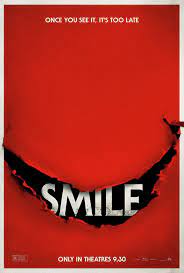
SMILE
US, 2022, 116 minutes, Colour.
Sosie Bacon, Kyle Gellner, Caitlyn Stasey, Robin Weigert, Jessie T.Usher, Kal Penn, Judy Reyes, Rob Morgan.
Directed by Parker Finn.
Smile is a beguiling word. And many smiles themselves are beguiling. But, this is not the kind of smile in the title of this film. Rather, there is that other aspect of a smile, a grin, sometimes a fixed grin which might look immediately cheerful but is ultimately sinister.
There are some suggestions that Smile is something of a horror film. That is not quite exact. Rather, it can be described as “eerie”, atmospheric, with some dramatic and grim moments, moments of blood and gore, but the film is more of a psychological portrait of a young woman, becoming more and more disturbed. (This description of “eerie” does more justice to this kind of film which can be seen by a wider audience than devotees of horror, blood and gore, because they create tension, apprehension, a recent example of which was the abduction thriller, The Black Phone.)
The central character is a young doctor, a therapist, eager to work, overworking, in a central hospital, interviewing patients with mental problems. She is called back to interview a young woman, very much disturbed, a PhD student whose professor has killed himself in front of her. Then, with a grimacing grin, rather than a smile, she kills herself in front of the doctor.
The doctor is played by Sosie Bacon (daughter of Kevin Bacon and Kyra Sedgwick), an intense young woman who is disturbed by memories of her mother killing herself and her not trying to intervene. She interacts with her sister who lives a comfortable life, clashing with her about their mother. She also has a fiance, a comparatively passive character rather than understanding and supportive.
Because the doctor is so preoccupied with what has happened to her, she wants to investigate the background of the doctor who killed himself, visiting his widow, upsetting her, and then going to visit her former boyfriend, a police detective, and asking him to get information, photos…
What ensues is the discovery of a whole chain of such deaths, the smile, the suicides, and seemingly the passing on of a curse. And the suggestion is of the paranormal, something of the presence of an evil entity that is continually passed on.
Ultimately, the doctor has to confront her past, revisit the family house, experience what happened with her mother. And an unexpected (perhaps expected) finale.
- An eerie film? Touches of horror? Touches of gore? Realism? The paranormal?
- The New Jersey settings, the hospital, exteriors and interiors, offices? Apartments? Stores? Therapy sessions? The surrounding countryside? The house in the country? The musical score?
- The title, cheery? The victims and their sinister smile? The range of smiles? And the culmination?
- Rose, her story? Working as a therapist, overworking, her relationship with Trevor, but preoccupied? The encounter with Carl, his mutterings about death? The encounter with the Laura, her story, the professor and his suicide, her smile, cutting her throat? The effect on Rose? Dr Desai and his concern, Rose and the time off? Her visiting her therapist, the questions, her answers, the dinner with her sister and brother-in-law, their money talk, her reaction? Preoccupied, listening to the tape of Laura over and over again?
- Trevor, the engagement, rather quiet in the background, Rose turning on him? His calling in the therapist?
- Rose, her dreams, her dead mother, her hallucinations, characters smiling?
- The confrontation with her sister, the conversation about their mother, her mental condition, Rose at home, her sister leaving, Rose and her dying mother, not getting help? Continued guilt?
- The crisis at the party, Rose buying the gift, the cat lost, the cat in the box, everybody’s reaction? Her falling through the glass table?
- Joel, role as police, the interrogation, revelation of the past relationship, her contacting him, the various files, the professor who killed himself, his witnessing the suicide, at the service station, the man with the shears, Joel discovering the train of suicides and deaths? The survivor? Going to see him in the prison, his reaction, the revelation that was only by killing someone else that the curse could be avoided?
- The pressure on Rose, to kill herself, to kill someone else, the possibility of killing Carl, in the hospital, the doctor’s reaction?
- The visit of the therapist, Trevor, the questions, the deathly smile, the hallucination?
- The return to the family home, the presence of her mother, the appearance of her mother, the flashbacks to her as a little girl with her mother, the present, the monstrous mother, Rose, decisions, the fire?
- Rose outside the house, audience relief? Joel and his arrival – and Rose and her smile, to kill herself, the consequences for Joel?
- The realism in the plot development? Evil entity? The paranormal?
See How They Run/ 2022
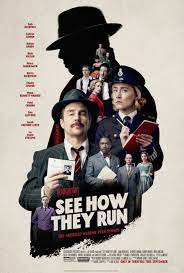
SEE HOW THEY RUN
UK, 2022, 98 minutes, Colour.
Sam Rockwell, Circe Ronan, Adrien Brody, David Oyelowol, Ruth Wilson, Reece Shearsmith, Shirley Henderson, Charlie Cooper, Ania Marson, Jacob Fortune-Lloyd, Laura Morgan, Pippa Bennett-Werner.
Directed by Tom George.
See how they run. Three blind mice. The Mousetrap. Agatha Christie. Whodunnits. And, that’s what it’s all about.
This reviewer is more than partial to detective stories, to whodunnits, to the various screen versions of Agatha Christie novels, Poirot and Miss Marple. If you share this partiality, this film is yours. Which makes it rather harder to review for those who are not caught up by whodunnits. Probably the best advice is: at least give it a try, there is much to entertain and amuse.
Early in the piece, the obnoxious American director who has been invited to London to direct a film version of The Mousetrap, mocks (and this is all visualised as well) the expected conventions for a whodunnit, especially in the Agatha Christie vein, the remote mansion, the range of (odd) characters, the suspects, the murder, the investigation, the revelation. The American director also wants to storyboard a rather graphic violent conclusion to his film which shocks the rather prissy writer, David Oyelowo, and suggests there be flashbacks which the writer considers absolutely obnoxious. Of course, that is what we get, but in very comic ways.
The director, played by Adrien Brody, does a voice-over telling us that the character who annoys is most likely to be killed – and he is (though gets a strong performance in all the flashbacks!). The occasion is the hundredth London performance of The Mousetrap (starring real life Richard Attenborough and his wife, Sheila Sim), a celebration, the producer wanting it to close so that he can get the film out before everybody knows whodunnit, the other producer wanting it to run and run (which it has done for more than half a century!). There are various other characters, people who work in the theatre, the cast, the prissy writer’s partner. And, to this reviewer’s satisfaction, the murderer is unexpected but the motivation very well worked out and explained.
But the enjoyment is not so much in the suspects but in the police Inspector and his eager (understated) rookie constable assistant. It is surprising to see American Sam Rockwell in the role of the London detective, limping from a war injury, drinking, touch of the taciturn, but persevering in his interviews. The delight is Saoirse Ronan as the constable, garrulous, eager to pin the murder on the next suspect, taking everything down iin her notebook (which eventually does come in handy), a movie lover, quoting films and movie information all the time (and there are some very entertaining references for film buffs, some actual references to Romulus Studios and its founderr and his production of The African Queen).
So, there is a lot of amusing dialogue, plot tangles and suspicions, and some more murders.
And, there are some visits to The Mousetrap, especially for the two police with complimentary tickets from Richard Attenborough. Agatha Christie fans will enjoy the final part of the film, the setting up of the main characters to come for dinner at Agatha Christie’s country house, to be entertained by her husband (tongue in cheek portrayal by a black actor), archaeologist Max Mallowan, who offers Mesopotamian cocktails. And Shirley Henderson obviously enjoys herself playing Agatha – who has quite an instrumental role in the climax, apart from putting something in the main suspects tea but somebody else drinking it!
Happy ending, a medal for the Inspector, top marks for the constable and her graduation, their going to see The Mousetrap in comfort – and the Inspector, emulating the final scene from the play, turning to the cinema audience and warning them not to reveal the ending!
- The popularity of whodunnits? Of Agatha Christie stories? Off her play, The Mouse Trap?
- The atmosphere of 1953, London, the West End, theatres, streets, homes, pubs, Scotland Yard? The country estate of Agatha Christie? The musical score and echoes of the time?
- Audience awareness of The Mouse Trap, 100 performances in 1953 – and still continuing? The Agatha Christie plot, allegedly based on a true story, the murders, the solution, the police asking the audience not to give away the solution (as in the play itself)? And the reprise of this at the end of this film? Richard Attenborough and Sheila Sim in the play? In this film actual producer John Wolf? Fictionalised?
- The opening narration, American, American perspective, the director, criticism of whodunnits, the humorous overview of how whodunnits work? The most unlikeable person killed, his murder? His behaviour towards everyone? His wanting flashbacks (to Mervyn’s disgust)? The film including flashbacks, his fight with Mervyn and tearing the manuscript, his storyboarding of how the film should end (and this film using the same storyboarding)? The story of the war, his illegitimate son? The clash with Petula? His attempt at seduction with Sheila Sim? The fight with Richard Attenborough, the cake, the fish service, changing his clothes? His death?
- The performance of the play, the cast and staff remaining in the theatre after the murder? The introduction to the range of suspects? Mervyn, prissy playwright? His Italian, emotional companion? Petula as producer, self-assured, employing her ancient mother? Richard Attenborough and his reputation, Sheila Sim and her reputation? Dennis, usher?
- Introduction of Inspector Stoppard (and the Tom Stoppard, Real Hound reference)? Constable Stalker? His limp, war experience, world-weary, his drinking, the group, the individuals, interviews, accountability to Scotland Yard? The contrast with Stalker, ingenuous, film fan and the range of references, writing everything down, talking a lot, quick to conclusions concerning the killer? Her background, husband dead in the war, her two children, home?
- The two working together, odd couple, Scotland Yard and speeches about women in the force? Responsible to the Home Secretary? Travelling together, in the car, Stoppard losing patience, Stalker with answers and addresses? His excursion to the dentist, to the pub, her tracking him down, her covering for him with Scotland Yard?
- The investigations, questions, the insertions of the flashbacks?
- Jokes about whodunnits, this film using all the conventions and twisting them, jokes about Agatha Christie?
- The play going on, everybody at the play? Audience knowledge about Mervyn and his animosity towards the director? The jealousy of his boyfriend? Woolf, his secretary, going out with her, discovered by the director and the blackmail, his suite at the Savoy? The producer wanting the play to end so the film could be made before everybody knew whodunnit? The producer, the job to her mother, her mother paying her rent? Dennis, his presence in the foyer, observing, Mervyn telling him about the writing for the screenplay?
- The red herring with Stalker’s presumptions, that Stoppard was the killer, seeing him over the dead body, the director’s book with women’s names, tracking down Joyce, the presumption that Stoppard’s wife was pregnant by the director? The attack, in prison, the interrogation?
- The invitation to Agatha Christie’s home, the producer and his mistress, the Attenboroughs, Petula and her mother? Dennis and his arrival, thinking Agatha Christie was in the rug, in fact the producer’s wife? The pompous butler and his manner, the urging him to pick up the rifle? Max Mallowan and his Mesopotamian archaeology background? Agatha Christie arriving, controlling Dennis, making the cup of tea, the poison, giving the cup to Dennis, the butler collapsing and dying? Sheila Sim throwing the Molotov cocktail, Richard Attenborough hiding behind the sofa? Agatha Christie confronting Dennis, her killing him?
- Stoppard and Stalker investigating, the background of the play, finding the invitations, their speeding to the mansion? And everything is solved?
- Their going to the play together, Richard Attenborough promising them tickets? And Stoppard using the same script as the play in warning the audience not to reveal the murderer?
- Stoppard and his award? Stalker topping her examinations? And a knighthood for the chief it Scotland Yard!
Ombra del Giorno, L'/ Shadow of the Day
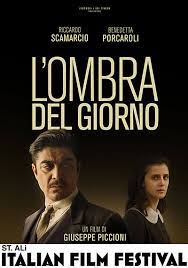
L’OMBRA DEL GIORNO/SHADOW OF THE DAY
Italy, 2022, 125 minutes, Colour.
Riccardo Scamarcio, Benedetta Porcarelli, Valeria Bilelllo, Wael Sersoub, Sandscheck Ceccarelli, Antonio Salines,, Lijno Musella, Costantino Seghi.
Directed by Giuseppe Piccioni.
A very serious film about Italy in the 1920s and 30s, the experience of fascism, presented on a smaller scale, in the town of Ascoli. While the focus is narrow, the experiences dramatised are a microcosm of what was happening in Italy in the Fascist era, under Mussolini, state efficiencies, about oppression, people spying on each other and denouncing each other, eventual persecutions and arrests, and Operation of the Jews.
The focus of the film is a veteran from World War I, military achievement and recognition of killing in defence of his fellows, but his leg injury and a limp. He is Luciano, played by Riccardo Scamarcio, now veteran of so many Italian films as well as international performances. He is disillusioned after the war because the population denounced the veterans rather than acclaiming them. And he has the fascist beliefs, and is in contact with various friends who have made their way in the fascist bureaucracy.
Much of the film shows the ordinary life of the town in this situation. The drama is heightened when a young woman, mysterious, Anna, ask for a job, is employed by Luciano and is very successful, working with the staff, including the joking antifascist cook who also sells material on the black market, even to fascists, helping Luciano managing the restaurant. And there is an attraction between them.
As the 30s progress, the visit from Hitler to Mussolini, people listening to broadcasts on the streets, the tension becomes more serious with the revelation about Anna and the arrival of her French husband, a writer. Luciano has to make decisions concerning Anna, whether to hide the husband or denounce him.
Anna is played by the striking Benedetta Porcarelli (who also appeared, as did Scamarcio, in The Catholic School just before this film).
There is political tension, oppression, investigations as well as the emotional repercussions, with Luciano finally having to make some decisions about himself and what he will do in the future, letting go of his fascist past.
- The title? The day – the fascist Europe? Its shadows?
- The period, costumes and decor, the fascist hero, black shirts, citizens in fear, conformism? Authorities? The broadcasts, propaganda? The musical score? The music, songs?
- Ascoli, the city, the restaurant, interiors, kitchen, dining, the seller? The square outside? The streets? Luciano’s apartment? The trip outside the city, the coast, the beach, the sea?
- The political stands of the film, antifascist? In the context of 21st-century politics?
- Luciano’s story, the 1930s, his memories of the war, top soldier, killing six, his injury and limp, the return from war, popular feeling against them, expecting acclaim? His fascist beliefs? Yet cautious with others expressing opinions? His father, working for the owner of the restaurant, his managing the restaurant, his staff and interactions? Customers? His lonely life? The past, Amelia, her leaving for Rome, her career, return to Ascoli, borrowing money from him? His friendship with the old professor? His friendship with Osvaldo, the fascist connection?
- The staff, Maria and her ordinary work, Giovanni, cheerful, antifascist, his deals with watches and jewellery? The hiring of Corrado, knowing him for many years, the courtesy to his mother? Corrado, young, ambitious, fascinated by the fascists, listening to them, discussions, meetings?
- Anna, outside the restaurant, the conversation with Luciano, his hiring her, her not having a story, willing to work, hungry, her success at work, Luciano’s admiration, with the other staff, friendship with Giovanni? The various jobs, serving in the restaurant, promotions? The bond with Luciano, their talking, giving her a lift, the outing, the dancing, the return home, the sexual encounter? The future?
- Anna as Esther, the Jewish background, finally telling Luciano, her husband arriving, in the restaurant, reactions? Anna and her plea, hiding her husband in the cellar, time passing, confined, his writing, antifascist, French background, trying to repair the wireless, the darkness and the loneliness pressing him? Esther and her resistance, the sexual experience and the consequences?
- The changes in Italy, the reporting of the stranger, Osvaldo and the photos, the denials? Osvaldo warning Luciana?
- The interludes with the girls and their gymnastics outside the restaurant? Rollerskating, the girl falling? Symbol of fascist action and ambitions?
- Rumours of war, the visit of Hitler, popular reaction, listening to the broadcasts on the streets?
- The time moving more rapidly, the weeks passing, the husband in the cellar and his growing his beard, getting desperate, the conversations with Luciano? Some bonding?
- Osvaldo and his men, the information about the husband, the photos, everybody denying? Osvaldo and his warning? The meal, the fascist celebration, Corrado and his wanting to join them, being left behind?
- Corrado overhearing about the seller, going down, his gun, the confrontation with the husband, Corrado boasting, the husband distracting him, the fight, his being shot? Luciano’s response, the body?
- Corrado’s mother, her pampering him, her coming to the restaurant, Luciano reassuring her?
- The decision for Esther and her husband to leave, the arrangement with the boat, the request that Luciano should come, the final encounter between Esther and Luciano? Packing, the drive, on the beach, the boat, the farewell?
- The end, Luciano knowing what he had done, throwing away his military medals, the change of attitude from his experience?
Kensington Monastery, Peter Guy MSC appointed Superior.
Kensington Monastery, Peter Guy MSC appointed Superior.

(Recent photo of Peter by John Walker MSC)
Peter Guy is not a stranger to being the Superior of the Kensington community. He has had six years previous experience and valued for it. This new appointment began on September 30th, Steve Dives, after surgeries and recuperation, will not continue. In the meantime, Ben Fleming has been acting superior.
We join our MSC Sisters on the centenary of the death of Fr Hubert Linckens MSC.
We join our MSC Sisters on the centenary of the death of Fr Hubert Linckens MSC.
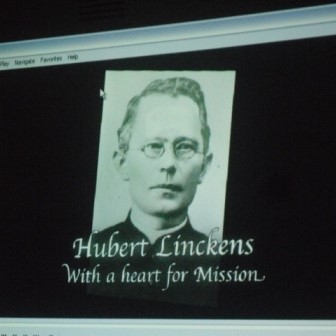
Our Founder
Father Hubert Linckens, a Missionary
of the Sacred Heart
was entrusted with the task
of beginning this new Religious Congregation.
He was filled with the charism and spirituality
of his own Founder
Father Jules Chevalier.
Father Linckens had also discovered
in the Heart of Christ
the compassionate love of God for all humanity.

For historical background, excerpts from To the Ends of the Earth by Francis Baum MSC
Born in Wijlre, Holland, on 29th January, 1861, Peter Joseph Hubert Linckens was the second child of his father‟s second marriage. His father, John Martin, had four children by his first wife, who died at the age of thirty-one. Hubert, as he was called, had three younger siblings. He was only eight when his mother died. So the father was assisted in his care of the family by a housekeeper, who wasn‟t very popular with the children. After some years, Hubert‟s younger, fourteen year old sister took over the household.
John was a strict but faith-filled father and obviously did the best he could do for his children. One of his daughters, from his first marriage, became an Ursuline Sister at Sittard. It was from her that Hubert first heard about devotion to Our Lady of the Sacred Heart. It was she who became his confidante when he was trying his desire to become a priest. She told him about the Society of the Missionaries of the Sacred Heart at Issoudun in France and also the Apostolic School nearby. She spoke to their father about Hubert‟s desire. Consequently, at age fourteen in 1875, he was allowed to travel to Issoudun and join the Apostolic School at Chezal Benoit.
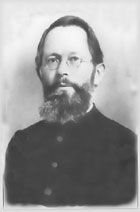
He started his novitiate at St. Gerand le Puy, France in 1880 and there experienced with his confrères the expulsion of all clerics from their monasteries. With Fr. Piperon, he was one of those entrusted to make, in haste, a place liveable for the students and some priests.
The place was Tilburg, Holland and the building, an old warehouse. Life there was spartan and hard and the students suffered from cold and hunger. Hubert‟s cousin, Henry Kicken, became so ill with TB that he had to return home and died soon after. Besides studies for the priesthood, Hubert also gave lessons himself and assisted in all the manual work. This experience, while harsh, stood him in good stead for the future.
As soon as he was ordained in 1886, Hubert continued in his role as work. In 1887 he transferred from Tilburg in Holland to Antwerp in Belgium with the German and Belgian students. Antwerp was the German Colonial Port. From 1884 on, the presence of students who were being prepared to go to the German Colonies was acceptable to the German Government.
One needs here to interrupt this story to briefly explain that Germany, too, had its anti-Clerical and anti-Church stance. This had happened after the Franco-Prussian war of 1870/71, when Bismarck Many other repressive laws were enacted and no Religious Institution could be established. After some years these laws became less stringent. We see in the many writings of this time that Fr. Linckens could only carry out the mandate of his Congregation to establish the North German Province with the express request and permission of the German Government in Berlin and its approval at all stages.
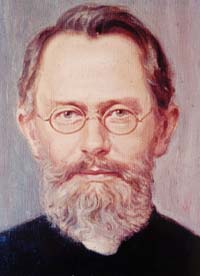
Negotiating with the German Government was intense, hard work, requiring skilful diplomacy, even acceding to the demand that he take on German Citizenship. His Superiors in Issoudun knew that Hubert Linckens could be relied upon to carry these negotiations through to a successful conclusion. After the dispersion of religious from France, the MSC Congregation needed to establish some centrality. This could come about because the German Colonial Office wanted Missionaries as cultural ambassadors in the German South Seas Colonies. They also saw the advantage of having German missionary sisters in the Colonies. Bishop Couppé also was pressing Fr. Linckens to send sisters urgently to the South Seas. Hence the establishment of our Congregation, the Missionary Sisters of the Most Sacred Heart of Jesus.
Fr. Hubert Linckens was entrusted with the task of establishing the North German Province of the Fathers and Brothers in 1896 and chose Hiltrup Münster as the most appropriate place. He had already been appointed as Mission Procurator for the “South Seas Mission” as it was called, in 1894. The idea of establishing a sister Congregation, originally proposed to be a branch of the Daughters of Our Lady of the Sacred Heart, did not eventuate. The German Government would allow no French sisters, missionaries or edu-cators. Correspondence on the matter took time but eventually ceased.
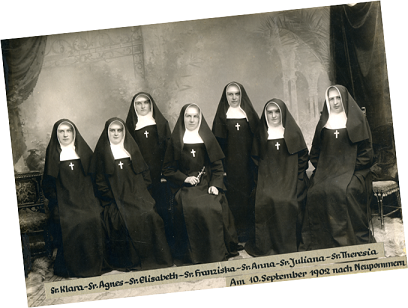
There was only one other solution. Linckens now had to face a new reality. He would have to found an entirely new Congregation. The purpose was to parallel the spirit, life and mission of the MSC Fathers and Brothers and to minister with them in the German Colonies, namely what was known as Melanesia and Micronesia or „The South Seas‟. This Mission had been entrusted to the pastoral care of the MSC‟s by Leo XIII in 1881.
Frustrated at not being able to establish a branch of the Daughters, Hubert Linckens now saw as the Will of God that he set about the onerous task of dealing once again with the German Colonial Office so as to establish our MSC Sisters‟ Congregation. Once Linckens realized in his life that God was calling him to something, he set about fulfilling this task with deep conviction, prayer and trust in God. The Divine Will and trust in the Providence of God were two attitudes which accompanied his whole life. He wanted the new Congregation to carry the same name, motto and mission as his own.
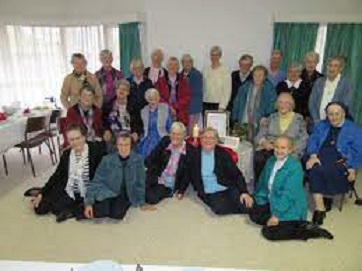
2018
Fall, 2022
FALL
US, 2022, 117 minutes, Colour.
Grace Caroline Currey, Virginia Gardner, Jeffrey Morgan.
Directed by Scott Mann.
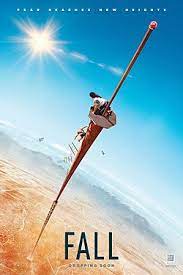 A necessary caution. And it is those who are vertiginously inclined, are afraid of heights, agoraphobic… As the title indicates, in a film about climbers, there is always the possibility of a fall. And, this is a film definitely about climbers, opening with them on bare high rock faces, but the main focus is on two young women, deciding to climb a 2000 feet high television tower out in the desert. So, audience identifying with the enthusiastic daring of the young women, and enjoy climbing, this is your film.
A necessary caution. And it is those who are vertiginously inclined, are afraid of heights, agoraphobic… As the title indicates, in a film about climbers, there is always the possibility of a fall. And, this is a film definitely about climbers, opening with them on bare high rock faces, but the main focus is on two young women, deciding to climb a 2000 feet high television tower out in the desert. So, audience identifying with the enthusiastic daring of the young women, and enjoy climbing, this is your film.
One of the intriguing aspects to observe while watching is how you put together a film about climbing, dangers, missteps, bolts coming loose in fittings, aerial shots, close-ups, editing and reactions, all the techniques to make the audience feel they are doing the climbing as well as surviving at the top of the tower.
And, the way that the filmmakers keep our interest is, of course, introducing the human elements, the relationship between the two girls, the husband of one of them, the anxious father who disapproved of the marriage, difficulties and the different ways of coping, drinking to forget, or just getting out there and facing the reality. Which means then that in the background of the climbing is a great deal of sentiment with touches of melodrama.
Back in the old days of the 20th century, with the Saturday matinee programs, there were the serials, and episode every week, each one ending with what was called a “cliffhanger”. And, this is how the drama works in Fall. One after the other, the young women are challenged by all kinds of difficulties, testing their ingenuity, possible solutions, the excitement of trying out each solution and the dismay when all of them, all of them, fail. Which means that along with identifying with the climbers, we are identifying with the situations and experiencing the cliffhangers. (And they range from a bag with water dropping, circling vultures, two men who actually steal the climbers car, phones, a flair, a drone, and vivid hallucinations.)
So, a film of some vicarious thrills but also the best part of two hours and plenty of potential for acrophobia.
- The title? Daniel’s accident, his fall? The consequences? The climbing of the town, the challenge, the dangers, the consequences?
- Locations, the mountains, vast peaks, vast mountain faces? The desert, the tower, the physicality of the tower, climbing inside, climbing outside, the dish spaces, the top? The musical score?
- The introduction to Becky and Hunter, to Daniel? Becky, the cremation and the ashes, her drinking, almost a year passing, the challenge from her father and her disdain? The arrival of Hunter, and the challenge to climb the tower, reluctance, Becky and her nightmares with Daniel, her decision to climb?
- Hunter, outgoing personality, risks, self-confidence, power of persuasion? The past relationship with Becky? Travelling, the motel, the information? Going through the warning gate? Walking, the plan for the climb?
- Audiences identifying with the climbers, or not? The filming of the climb, looking up, looking down, looking across the desert, editing, pace, the difficulties, physical, rungs coming loose and falling? Becky, apprehensive? Hunter urging her on? Eventually getting to the top, the sense of achievement, for Becky a sense of relief?
- The fact of climbing, no contact with the authorities, security…?
- The beginning of the climb down, the rungs getting loose, the whole ladder falling? The reaction?
- Stranded on the top of the tower, the reaction of each young woman, Hunter and her optimism, Becky and her being overcome? The attempted various solutions, the cliffhangers? The bag with the water, its falling, Hunter going down, the rope, swinging, putting the water on the rope, Becky hauling it up, Hunter climbing up? The background of seeing the buzzards with the dead animal, the vultures flying around, their eventual attacks and brutality? The exhilaration of filming the achievement, on the phones, with the drone? The phones not working, putting one in the shoe and hurling it down? Recharging the batteries of the drone, Becky climbing to the top, the vulture attacks? Sending the drone, with the message, its almost succeeding, the truck hitting it? Seeing the man at the bottom, getting their retention, the flare, there are ignoring it, stealing the car? The days passing? Hopes of rescue?
- Becky, the hallucinations? The discovery of Hunter’s fall? The birds? Becky getting her courage, the message on her phone, climbing down and getting the phone into Hunter’s body, pushing it over?
- Becky’s father, concern, getting the message, hurrying to the site, seeing the body put in the ambulance? Reunited with Becky?
- Conventional story lines as a background for the climb, survival at the top, rescue?
